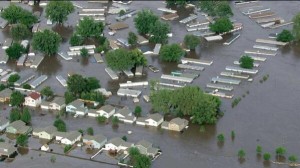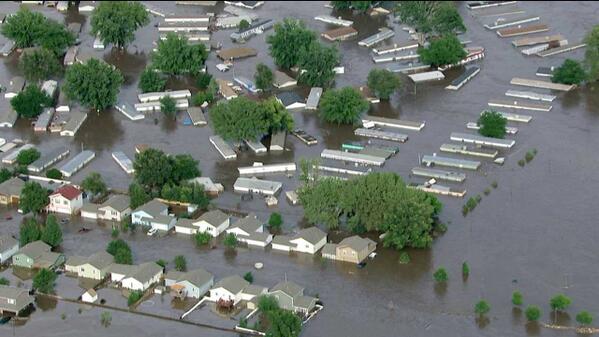
An October opinion piece in the Coloradoan by Kate Browne, an anthropologist whose work includes disaster recovery research and a broadcast documentary on the aftermath of Katrina, prompted Anthropology Now to post a call for commentary on the Anthropology and Environment Society listserv. We sought short, opinion page-style essays on whether culture brokers can indeed contribute to a paradigm shift in disaster recovery. Browne’s column is linked below, followed by Elizabeth EnglandKennedy’s commentary on how culture-broker training can help to secure the safety of people with mental health needs amid natural or social disasters. These two writers contribute insightful analyses that are also strong models for accessible, anthropologically-informed public commentary in a short format.
We want to help keep this type of conversation going by providing a platform where anthropologists can write confidently about current topics in styles that have reach. If you would like to elaborate on archaeological, biological, cultural or linguistic themes raised in a current news article, please submit a 50-word prospectus and a link to the original piece to vesperi4anthronow@gmail.com
— Maria D. Vesperi, General Editor
‘Culture brokers’ have role to play in flood disaster recovery

by Katherine E. Browne, professor of anthropology at Colorado State University
As a disaster anthropologist and someone who has worked with a large, working-class, African-American bayou family for years following Katrina, I am writing to bring attention to a little-understood problem in disaster recovery. Certainly every person impacted by the flooding in Northern Colorado deserves recognition for their trauma and losses, and they all need help recovering. But the capacity to recover is not equally distributed, for reasons most people have never thought about. In my experience, recovery is not just about resolve and personal initiative. Continue reading Katherine Browne’s piece here…
The Need for Culture Brokering for People with Mental Illness during Disasters
by Elizabeth EnglandKennedy, Department of Public Health Sciences, New Mexico State University
As an anthropologist working with mental illness and forensic social systems, I would like to highlight the need for culture brokers who are able to work with people with severe and persistent mental illnesses (e.g., schizophrenia) and other mental health difficulties during natural and social disasters. Specifically, there is high need for brokers who can help these individuals navigate treatment and law enforcement structures and find appropriate care and safe haven during crises. The support need is especially high for people from economically disadvantaged backgrounds, whose primary language is not English, who use non-allopathic medical systems, and/or who display culturally-specific idioms of distress to cope with situations of trauma. I have found that such individuals typically lack the sociocultural capital and communication skills required to successfully negotiate situations with bureaucracies such as FEMA and insurance agencies, even when their mental health is sound.
In disaster situations, these people may lose not only their immediate supply of medications, but also access to social supports and familiar treatment providers. Loss of access to treatment and trusted social others, especially in combination with shock, panic and a sense of being emotionally and cognitively overwhelmed, is likely to increase disorientation. It can lead to states of cognitive and emotional dissociation in which symptoms and other internal experiences override the person’s usual perceptions and decision-making abilities, potentially leading to violent and/or suicidal thoughts and actions. People in this form of extreme distress experience hallucinations, delusions and other internal experiences so powerful that they are unable to take actions that increase safety in a disaster situation, and can instead unknowingly endanger themselves and/or others. Individuals who maintain some control may still have exacerbated difficulty in accurately assessing risk; this is worsened by the repeated traumas experienced during disaster. If they are unable to maintain prescribed medication or other treatments for days or weeks, the risk of danger to self and others rises substantially.
In an increasing number of areas, first responders (e.g., police, firefighters, and emergency medical technicians) receive Crisis Intervention Training (CIT). This is designed to provide them with skills for de-escalating situations in which someone is endangering self or others, and/or is in mental health crisis. However, this training is inadequate in disaster situations. It is designed only to help first responders calm people and bring them to allopathic services such as hospitals or crisis triage centers. During disasters, such facilities may be overwhelmed. Further, exigent circumstances likely mean that first responders will not have time and other resources required for CIT service provision or for helping individuals in crisis obtain specialized or culturally-appropriate treatments and supports.
The Substance Abuse and Mental Health Administration recently approved a course known as Mental Health First Aid (MHFA), a certificate program designed to reduce stigma by helping people learn how to offer support to individuals in mental health crises. However, it has limited availability and is designed only to enhance participants’ comfort level in speaking with people in psychological distress and contacting known sources of care. Individuals with MHFA training are not educated on ways to help people locate and enter appropriate treatment systems during times of disaster, particularly if the individual in distress uses a non-allopathic treatment provider, such as a curandero.
A limitation of programs such as CIT and MHFA is that they assume the validity and cross-cultural reliability of diagnostic categories. Individuals describing experiences interpreted as “delusions” or “hallucinations” by CIT- or MHFA-trained personnel could be inappropriately transferred to enforced allopathic treatment or incarcerated. People who hear voices of spirits or ancestors could be physically forced to undergo medications, hospitalizations, or other forms of “treatment” or confinement that exacerbate their crises rather than enhancing care and self-determination. Culturally-appropriate and effective idioms of distress may be misinterpreted as “illness” when they are, in fact, personally useful coping methods, particularly in situations of re-traumatization. In such cases, system navigators and workers trained only in allopathic systems can increase distress and danger. There is urgent need for culture brokers trained in emergency management systems, locally-available mental health crisis treatments and supports and the legal protocols of FEMA and other governmental agencies that are likely to be mobilized in disaster settings.
 Liz EnglandKennedy is an Instructor in the Department of Public Health Sciences at New Mexico State University.
Liz EnglandKennedy is an Instructor in the Department of Public Health Sciences at New Mexico State University.



One Response
This so true. While there is a spiritually component in all cultures it is especially prevalent in the African American and Latino communities.. Ritualistic prayer could easily be perceived as more than just that.. Without cultural competency it could lead to serious consequences for an individual that would haunt them the rest of there lives.